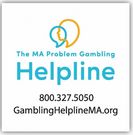Fast Facts
Gambling is not a good alternative for earning extra cash. Each game you play at a casino has a statistical probability against you winning. Slot machine odds are some of the worst, ranging from a one-in-5,000 to one-in-about-34-million chance of winning the top prize when using the maximum coin play.
Among all Addictions, gambling is linked to the highest suicide rate.
The odds of winning 10,000 dollars with a scratch is 1 in 407,000. Less likely than the odds of being struck by lightning which is 1 in 3,000.
What is Gambling?
Gambling is any activity or item of value is placed at risk in an attempt to gain something of greater value (e.g., participating in a game of chance, betting money, playing scratch tickets).
Gambling is an activity that carries risk.
Anyone involved in gambling activities has the potential to develop an addiction; however, some individuals and groups are more at-risk.
If you choose to gamble, create your own personal guidelines such as:
- Become educated about the warning signs of problem gambling.
- Set a dollar limit and stick to it.
- Expect to lose.
- Drinking alcohol while gambling carries additional risk.
- If viewed as entertainment, treat the money you lose as the cost of your entertainment.
- Set a time limit and stick to it.
- Never gamble on credit.
- Avoid “chasing” lost money.
- Don’t gamble as a way to cope with emotional or physical pain.
What is Problem Gambling or Gambling Addiction?
Problem Gambling is any gambling, betting or wagering that causes financial, legal, emotional or other problems for individuals, families and others close to them. Gambling problems can be mild, or quite severe, and can worsen over time.
Who is Most at Risk for Problem Gambling?
Individuals Who… (One or more of the following):
- Have a history of substance misuse;
- Have a mental health disorder/issue;
- Are disabled
- Have a high school education or less;
- Have a Yearly income of less than $15,000;
- Are unemployed;
- Men more than Women
- People of color.
Warning Signs of Problem Gambling
Are you or someone you know experiencing any of these symptoms?
- Spending more and more time gambling.
- Increasing gambling time and places
- Increasing bet amounts
- Creating occasions for gambling and canceling other plans.
- “Chasing” losses with more gambling.
- Increasing intensity of interest in gambling with high tension/excitement
- Gambling to escape problems of when there is a crisis.
- Boasting about winning and keeping loses to oneself.
- Exaggerated display of money and possessions.
- Decreased desire to engage in other activities and interests.
Frequent absences from work, school or home. - Withdrawal from family and friends. Withdrawal from family and friends.
- Using money on gambling that is for other purposes including living expenses.
Preventing Problem Gambling Among Youth
Talking to youth about the risks and consequences of engaging in underage gambling activities can make a difference in the choices they make. Parents and caregivers, educators and community members can take steps to prevent youth gambling behaviors.
- Encourage youth to be involved in positive social activities such as clubs, sports, and other positive community outlets
- Be a positive role model
- Talk early about the potential for gambling to be a problem
- Avoid giving scratch off tickets as gifts and/or encouraging underage gambling
- Monitor youth’s activities and friends
- Establish rules and enforce them
